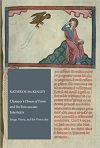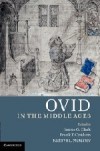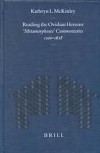
Areas of Interest: Medieval Literature, Chaucer, Ovid, Boccaccio
Contact Information
Email: kmckinle@umbc.edu
Office: PAHB 408
Office Number: 410-455-2006
Education
Ph.D. in English, University of Delaware
M.A. in Classics, University of Toronto
B. Phil. in English/Classics, Pennsylvania State University
Biography
Her research and teaching interests include Chaucer, Ovid, Boccaccio, and manuscript studies. Currently, she focuses on the social vision and aesthetics of emerging late medieval vernacularity. She has published in such journals as The Chaucer Review, English Manuscript Studies 1100-1700, Viator, and Le Tre Corone: Rivista internazionale di studi su Dante, Petrarca, Boccaccio. Her publications include Reading the Ovidian Heroine: Metamorphoses Commentaries 1100-1618 (Leiden, 2001); Ovid in the Middle Ages (Cambridge, 2011; coedited with Frank T. Coulson and James G. Clark); and Chaucer’s House of Fame and Its Boccaccian Intertexts: Image, Vision, and the Vernacular (Toronto, 2016).
Books

Chaucer’s House of Fame and Its Boccaccian Intertexts: Image, Vision, and the Vernacular
Pontifical Institute of Mediaeval Studies Publications, 2016
This study considers how Chaucer’s House of Fame engages Boccaccio’s writings as much as Dante’s. McKinley thus addresses in new ways this broader triangular relationship between Dante, Boccaccio, and Chaucer. Boccaccio’s Amorosa visione gave Chaucer a viable model for a response to Dante’s theocentric poetics.
d
D
 Ovid in the Middle Ages
Ovid in the Middle Ages
Cambridge University Press, 2011
This volume presents a groundbreaking series of essays on Ovid’s reception across the Middle Ages. The collection includes contributions from distinguished Ovidians as well as leading specialists in medieval Latin and vernacular literature, clerical and extra-clerical culture and medieval art, and addresses questions of manuscript and textual transmission, translation, adaptation and imitation.
D
D
 Reading the Ovidian Heroine: Metamorphoses Commentaries 1100-1618
Reading the Ovidian Heroine: Metamorphoses Commentaries 1100-1618
Brill, 2001
This study investigates the reception of Ovid’s heroines in “Metamorphoses” commentaries written between 1100 and 1618. The Ovidian heroine offers a telling window onto medieval and early modern clerical constructions of gender and selfhood.